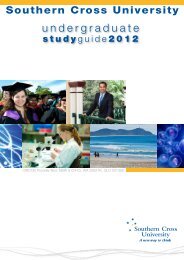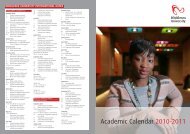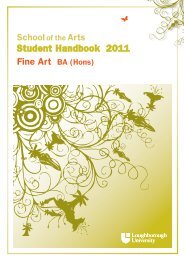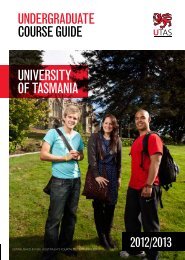pre-departure guide for exchange students - Study in the UK
pre-departure guide for exchange students - Study in the UK
pre-departure guide for exchange students - Study in the UK
- No tags were found...
You also want an ePaper? Increase the reach of your titles
YUMPU automatically turns print PDFs into web optimized ePapers that Google loves.
UQ Pre-<strong>departure</strong> <strong>guide</strong> <strong>for</strong> Exchange <strong>students</strong>7Liv<strong>in</strong>g <strong>in</strong> <strong>the</strong> hostcountryOrientation sessionMany of <strong>the</strong> host universities offer an Orientation program (especially <strong>for</strong> those <strong>students</strong> study<strong>in</strong>g at <strong>the</strong> beg<strong>in</strong>n<strong>in</strong>g of<strong>the</strong> host university’s academic year). Orientations provide <strong>in</strong><strong>for</strong>mation you will need about liv<strong>in</strong>g and study<strong>in</strong>g at <strong>the</strong> host<strong>in</strong>stitution. These programs also <strong>in</strong>clude social events which give you <strong>the</strong> opportunity to get to know both local <strong>students</strong>and o<strong>the</strong>r <strong>exchange</strong> <strong>students</strong>. You should consider <strong>the</strong> Orientation (if one is offered) mandatory and make your travelarrangements accord<strong>in</strong>gly.F<strong>in</strong>d<strong>in</strong>g accommodationIf your host <strong>in</strong>stitution does not provide on-campus hous<strong>in</strong>g or if you have elected not to take advantage of <strong>the</strong> oncampushous<strong>in</strong>g provided, you will have to f<strong>in</strong>d your own accommodation on arrival. Allow plenty of time (1-2 weeksbe<strong>for</strong>e Orientation or <strong>the</strong> beg<strong>in</strong>n<strong>in</strong>g of classes) to f<strong>in</strong>d suitable accommodation. Familiarise yourself with rental proceduresand tenancy rights (<strong>the</strong> host university should be able to provide this <strong>in</strong><strong>for</strong>mation to you). F<strong>in</strong>ally, if possible, take a localbuddy along when you view accommodation or <strong>in</strong>terview housemates.Culture ShockWhen go<strong>in</strong>g overseas, you will experience differences <strong>in</strong> all aspects of culture (food, manners, beliefs, customs, laws,language). Although com<strong>in</strong>g <strong>in</strong>to contact with new cultures can be very excit<strong>in</strong>g, it can also be overwhelm<strong>in</strong>g and canaffect you physically and emotionally. Some of <strong>the</strong> symptoms of culture shock may <strong>in</strong>clude <strong>the</strong> follow<strong>in</strong>g:– Feel<strong>in</strong>g isolated, alone, unable to make friends– Unable to sleep or sleep<strong>in</strong>g too much– Feel<strong>in</strong>g irritable and angry, especially with <strong>the</strong> local culture and people– Aches and pa<strong>in</strong>s – sore neck and shoulders, stomach ache– Unable to concentrate on your studiesIf you are experienc<strong>in</strong>g any of <strong>the</strong>se symptoms, please remember that <strong>the</strong>se reactions are normal. You are probablynot ill (although it is a good idea to see a doctor, just <strong>in</strong> case). More likely, you are suffer<strong>in</strong>g from culture shock andhomesickness. This is a temporary situation <strong>for</strong> people adjust<strong>in</strong>g to life <strong>in</strong> a new environment.How can you make a successful transition to liv<strong>in</strong>g <strong>in</strong> a new culture?1. Understand that <strong>the</strong>re are and <strong>the</strong>re will cont<strong>in</strong>ue to be uncerta<strong>in</strong>ties and confusion. Imag<strong>in</strong>e how a local residentmight react to liv<strong>in</strong>g <strong>in</strong> your country.2. Observe how people <strong>in</strong> your new environment act <strong>in</strong> situations that are confus<strong>in</strong>g to you. Try to understand what <strong>the</strong>ybelieve and why <strong>the</strong>y behave as <strong>the</strong>y do. Avoid judg<strong>in</strong>g th<strong>in</strong>gs as ei<strong>the</strong>r right or wrong; regard <strong>the</strong>m as be<strong>in</strong>g merelydifferent.3. Remember <strong>the</strong> ways you have been able to reduce stress <strong>in</strong> difficult situations <strong>in</strong> <strong>the</strong> past and apply those methods <strong>in</strong>your <strong>pre</strong>sent circumstances. For example, you might take a long walk, go to a movie <strong>the</strong>atre, or write an email to a closefriend or relative. Try to see <strong>the</strong> humor <strong>in</strong> confus<strong>in</strong>g situations that you encounter; laughter is often <strong>the</strong> best "medic<strong>in</strong>e."4. Accept <strong>the</strong> difficult challenge of learn<strong>in</strong>g to study and live <strong>in</strong> a new cultural sett<strong>in</strong>g. Believe that you can learn <strong>the</strong>skills to make a satisfactory transition. Gradually try to apply some of <strong>the</strong> skills you are learn<strong>in</strong>g.5. Recognize <strong>the</strong> advantages of hav<strong>in</strong>g lived <strong>in</strong> two different cultures. Your life will be enriched by meet<strong>in</strong>g peoplewhose cultural backgrounds are not <strong>the</strong> same as yours. Share your time with many different people. Avoid hav<strong>in</strong>gfriends only from your country but ma<strong>in</strong>ta<strong>in</strong> strong personal ties to your culture while you are away from home. Th<strong>in</strong>kabout how you can help local residents learn how people from your country believe and act.6. Acknowledge your progress <strong>in</strong> adjust<strong>in</strong>g to <strong>the</strong> new culture. Th<strong>in</strong>k of all that you have learned s<strong>in</strong>ce <strong>the</strong> day youarrived. Recognize that, like o<strong>the</strong>r people who have lived <strong>in</strong> an unfamiliar country, you can and will make a successfuladjustment to <strong>the</strong> o<strong>the</strong>r culture.Reference: http://www.jyu.fi/mcl<strong>in</strong>ic/cis/cop<strong>in</strong>g.html (University of Nebraska International Student Services)

















